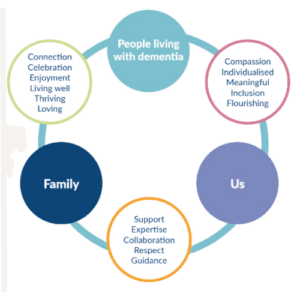Communicating with someone living with dementia can be challenging, but there are effective strategies that can make a real difference. In this article, we’ll explore some of these techniques, including our own ‘EVER’ model. Developed by our in-house Admiral Nurse, ‘EVER’ guides our approach to dementia care and highlights key communication methods.
Dementia Model
Our dementia model ‘EVER’ stands for:

Engagement: These are the different techniques used to approach communication and to build rapport.
Validation: This method is used to connect with people living with dementia emotionally through acknowledging their feelings.
Enrichment: Enables people with dementia to live full, meaningful lives.
Relationships: Acknowledging the importance of empathetic communication with others and supporting family members is key.
This model incorporates the different techniques we use to approach communication for those living with dementia such as building rapport, gentle close eye contact, empathetic communication and mirroring body language. These techniques are used to build trust, and to make the person feel comfortable and understood.
If you are taking care of a loved one who is living with dementia, here are five ways to communicate effectively:
- Don’t ask direct questions: Being unable to recall factual information can be distressing.
- Give them space to talk: Allow them to guide the conversation. Stop talking when they start, and avoid interrupting them.
- Avoid contradicting them: Even when they say things that are inaccurate, don’t tell them they’re wrong as this is at odds with their world view.
- Choose an appropriate time: People with dementia go through highs and lows. Make sure you match your approach to their mood.
- Focus on the emotional aspect: People with dementia still process emotions. Focus on making it a pleasurable experience, rather than focusing on a specific topic.
If you would like to learn more about how to support a loved one with dementia, call on our friendly team today.

